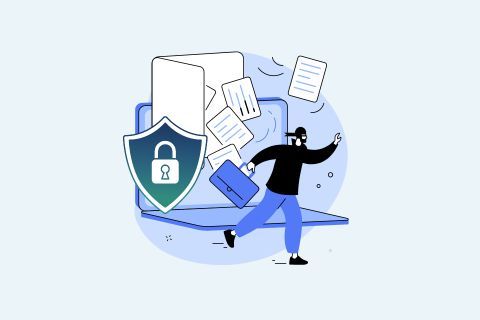How To Protect Your Data Online
- Home
- Self-Check Blog
- Self-Check
- How To Protect Your Data Online

June 28, 2023
In today’s digital era, people spend significant time online, engaged in various activities. Whether it’s conducting business, shopping, or connecting with friends, dependence on the internet has only increased. However, despite all positives of the internet, spending time online imposes some risks. Examples of such risks include hacking, phishing scams, and identity theft.
Unfortunately, it has become easier to acquire significant personal information about people. Thieves could learn your name, address, financial information, and more without proper precautions. They could use this data to assume your identity when committing crimes, open fraudulent credit accounts or loans, and more. As such, it is crucial to take precautions when surfing the web.
Here are a few simple but effective steps you can take to protect your identity in the digital world.
Ensure You Use Secure Connections
One of the easiest and most accessible ways of safeguarding your information is by using a secure connection. Secure connections encrypt your data as it travels between your device and the internet, making it difficult for hackers to access. You can confirm secure access by checking the URL. When online, look for “HTTPS.” If you see this, the site is safe and encrypts your data. Websites that use “HTTP” do not provide encryption services.
Another accessible option is to use a Virtual Private Network (VPN). VPNs encrypt all of your internet traffic, including your device’s location. However, VPNs often require you to sign up with a service provider. While relying on HTTPS works, a VPN has proven more effective for safeguarding your information. Should you choose to use a VPN, remember to research trusted providers to ensure the security of your data.
Be Mindful of What Data You Share
Watching what you share online is crucial, especially on social media platforms. Whatever you post or disclose on social media platforms and other websites can become visible to everyone, including cybercriminals. These criminals could exploit the information and commit identity theft, depending on what you reveal.
One way to protect your information online is to exercise caution when sharing data on your social media platforms. Always monitor whether you share your name, address, and other identifiable information online. To help safeguard your information, consider adjusting your privacy settings on the online platforms you use. Changing your settings can restrict access to your profile and posts, allowing only those you trust and know to view them.
Review Your Security Settings
Finally, reviewing your security settings will protect your digital presence. For example, you should check your passwords and create stronger versions. A strong password includes upper and lowercase letters, numbers, and symbols. In addition, you should avoid using easily-guessed phrases or identifiable information, such as names or birthdays. Finally, to help keep track of your passwords, consider using a password manager to store your passwords securely.
When applicable, consider enabling two-factor authentication. This option adds another layer of security by requiring another device or source to verify that you want into the account. Examples of two-factor authentication include receiving text messages or emails with passcodes that you must enter to allow access to the platform.
You should regularly update your security settings, ensuring you have the latest security features offered by the platforms and services.
Review Your Information With a Background Check
Unfortunately, identity theft is a crime that often flies under the radar. Depending on how long it goes unnoticed, finding and correcting all the damage can become difficult. Running a self-background check can help detect identity theft. The self-check would also reveal crimes or errors associated with your record. Once you discover problems, you can take corrective action by contacting the provider to contest the inaccuracies.
You can stay one step ahead of hackers and identity thieves by running a quick self background check. Click here to get started.
